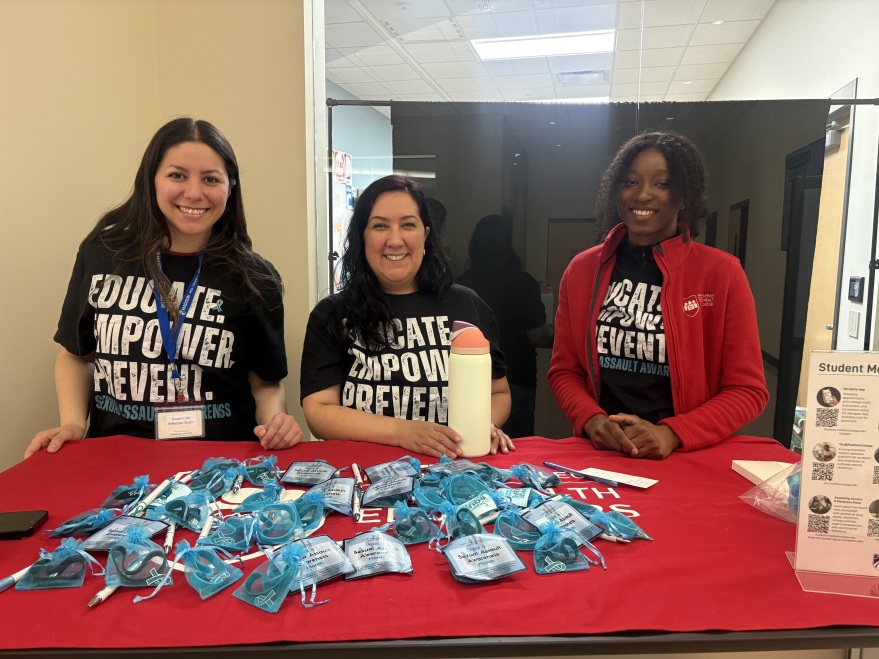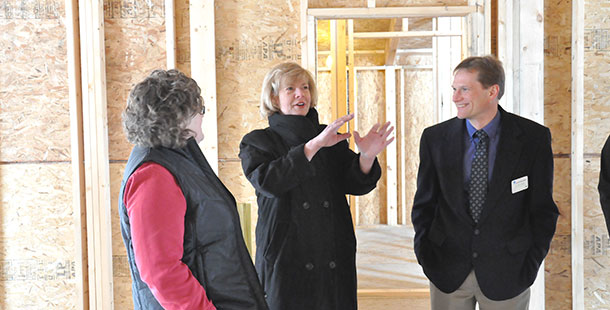U.S. Sen. Tammy Baldwin visited her home state of Wisconsin on Jan. 31 and stopped at the Madison College campuses in Fort Atkinson and on Commercial Avenue in Madison.
During her stop at the Commercial Avenue campus, she presented a newly introduced bill called The Grants for Renewable Energy Education for the Nation (GREEN) Act.
The GREEN Act allocates competitive grant funding for clean energy career and technical training programs so that students are better trained for post-secondary education and better equipped for the high-skilled jobs of the future.
She said getting more people back in the workforce is a challenge in the U.S. and technical colleges across the country play a huge role in reinvigorating the job force. She said Madison College is part of that and served as one of the primary reasons why she wanted to visit Madison College for the introduction of this bill.
“I believe this is one of the areas where there will be a lot of job growth in the future, so it’s a very promising professional career track for many people,” Baldwin said.
She said it’s great to have that focus because it improves communities and their surroundings, and homes when people are focused sustainability, renewable energy and efficiency.
She also said her goal is to see this focus grow within education and to establish green collar jobs, which are positions held in environmental sectors.
“My goal is focusing on everything from curriculum development to hands-on learning experience for students to push the walls of what is a green collar job and how can we create new ones,” Baldwin said.
Various state institutions including the Wisconsin Area Technical College system, corporations and national institutions like the Association of Career and Technical Education have supported the GREEN Act.
Joined by president of Madison College Jack Daniels as well as students and instructors, Baldwin started discussion by introducing aspects of the GREEN Act during a roundtable at the campus. While at the Commercial Avenue campus, Baldwin also focused the importance of “green collar jobs” and making sure that is introduced at a younger age.
“The GREEN Act seeks to plant the seed of the promise of green collar jobs, earlier and earlier — the idea that if you get exposed to some of the curriculums at the middle school level or at the high school level,” she said.
Workforce preparation must start as early as possible, Baldwin said. Developing green sectors and jobs is not only good for the economy but also for the benefit of the environnement and community. These two aspects, how to reconcile the technical, the economic and the more human aspect of green jobs will be more developed throughout the rest of the visit. These developments would be allowed by partnerships with between the public and private sectors, and conversation between the secondary and the post-secondary educational system.
Baldwin said technical colleges in Wisconsin could serve as a model for the rest of the country.
“It’s also, from a selfish point of view, (but it’s) an incredible opportunity to boast about an exceptional technical college system, and now I’m in my hometown. I can say an exceptional institution and technical college here at Madison Area Technical College,” Baldwin said. “We’re doing a lot of things that I hope the rest of the nation can take a look at, take advantage of and appreciate.”
The discussion started with a presentation by Dr. Ken Walz and Joel Shoemaker, instructors at the college. The presentation showed ways Madison College has been able to develop renewable energy programs thanks to grants received from the National Science Foundation.
There was a focus on the Renewable Energy Certificate. Introduced in 2006 at Madison College, the certificate was the first of its kind in the U.S. at a two-year college. The certificate offers an interdisciplinary curriculum that leads to a diversity of career paths. It was installed in order to anticipate the growing field of renewable energy and its impact on traditional field and programs in campuses.



























